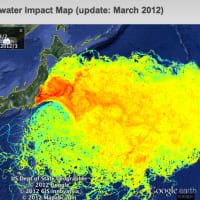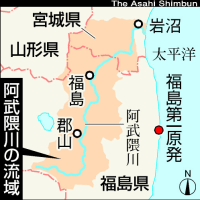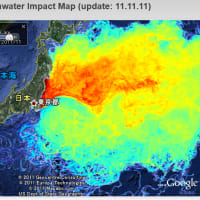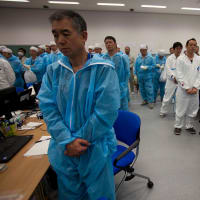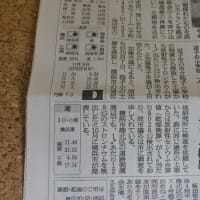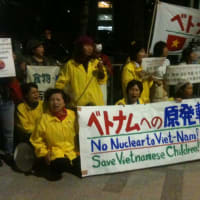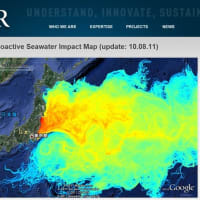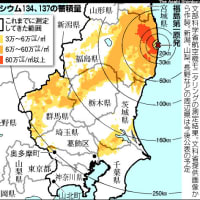福島を破局に陥れた東電幹部は牢屋に入れなければいけない。
SPEEDIを隠した者は傷害致死以上の罪状は明白。
再稼働明言を見過ごす政府内閣の人間にも裁きが不可欠。
今此の時も子どもたちに猛烈な被曝を強いて置き去りにしている立法府、行政、司法に職責がある者にも明らかな罪がある。
****
罪人を刑務所に入れて償わせるだけでなく、
騙されていた我々も、
有権者納税者として市民ひとりひとりに騙されていた者の罪があることを自覚する必要がある。
これまでの価値観、思い込み、生活を変えて贖う責任がある。
****
3月5日 AFP】東日本大震災から間もなく1年を迎えるにあたり、野田佳彦(Yoshihiko Noda)首相は3日に首相官邸で行った外国プレスとの会見で、原子炉がメルトダウン(炉心溶融)にまで至った福島第1原子力発電所の事故について「誰の責任というよりも、責任は共有しなければいけない」と語った。
東日本大震災では約1万9000人が死亡・行方不明となり、避難・転居者数も34万人を超えた。うち、福島第1原発の事故では放射能で陸地や海が汚染され、何万人もの住民が避難を余儀なくされた。
首相就任から約半年が経った野田首相は、日本の権力者たちが原発にまつわる「安全神話」を信じすぎ、福島第1原発で起きたような大規模事故に対する準備ができていなかったと述べた。
首相は、日本の法律下での一義的な責任は運営事業者である東京電力(TEPCO)にもちろんあるとしながらも、メルトダウンに関する刑事責任については次のように述べて退けた。「政府も、事業者も、あるいは学問の世界においても、安全神話に浸りすぎていたということは総括として言えるだろうと思う。誰の責任というよりも、誰もがその痛みは、責任は共有しなければいけないんだろうと思う」
また福島の事故からは、津波の被害を受ける可能性のある屋外に動力源を設置しないなど、さまざまな教訓が得られ、現在もそうした教訓を学んでいると語った。
日本国内の商用原子炉54基のうち、現在も運転しているのは2基のみだが、原発の安全性への懸念から運転再開には地元社会の反対が根強い。野田首相は、多くのエネルギーを必要とする日本は原発依存から脱却し、中~長期的には原子力発電に頼る必要のない社会を作るべきだとしながらも、原子力エネルギーを放棄するという約束は口にしなかった。
代わりに野田首相は多様な発電方法の組み合わせについて触れ、「ベストミックスというものについては間もなく、その選択肢を国民の皆さまに示したいと思う。そして年の半ば、夏をめどにその戦略と方向性を固めていきたい」と語った。
震災からの復興については順調に進展していると述べつつ「残念ながら、まだ行き届いていないとか、遅いというご批判は、これは甘んじて受けなければなりません」とコメント。今後5年間かけ集中的に復興を進め、10年以内に完了しなくてはならないと述べた。(c)AFP/Huw Griffith
http://www.afpbb.com/article/politics/2863022/8590462
*****
TOKYO — No individual can be held responsible for the nuclear meltdowns at Fukushima, Japan's prime minister said Saturday, insisting everyone had to "share the pain".
Yoshihiko Noda told foreign journalists in Tokyo that the Japanese establishment had been taken in by the "myth of safety" around nuclear power and was unprepared for a disaster on the scale of last March's accident.
A week ahead of the anniversary of the disaster, the premier swatted away a question over criminal responsibility for meltdowns that forced tens of thousands of people from their homes and polluted the land and sea.
"Of course, the primary responsibility under Japanese law rests with the operator" of the stricken plant, Tokyo Electric Power (TEPCO), Noda said.
"But the government as well as operators and academia were steeped too deeply in the safety myth and I think that is what we can conclude.
"Rather than blaming any individual person I believe everyone has to share the pain of responsibility and learn this lesson."
Noda's comments come just days after an independent investigation panel revealed the president of TEPCO had wanted to abandon the plant in the days after the tsunami swamped its reactor cooling systems.
A report compiled by private thinktank Rebuild Japan Initiative Foundation said it was only threats by then prime minister Naoto Kan that had prevented TEPCO from leaving the plant to its fate as the accident spiralled out of control.
Noda told reporters lessons had been and were still being learned from Fukushima, including "don't install power sources outside which are likely to be hit by a tsunami".
All but two of Japan's 54 nuclear reactors are presently offline, with local communities unwilling to allow them to restart amid a public backlash over the safety of a once-trusted technology.
Noda said electricity-hungry Japan would diversify its power sources, but stopped short of pledging to abandon atomic energy.
"We have to grow out of our dependence on nuclear and we have to establish in the medium to longer term a society that does not have to rely on nuclear power generation," he said.
"We need to think about the best mix of energy that will give a sense of reassurance to the Japanese people. Some time in the middle of this year we would like to set the direction for this strategy."
The prime minister, who came to power almost exactly six months ago, said a year on from the tsunami that claimed 19,000 lives and left hundreds of thousands of people homeless, progress in righting Japan was being made.
But he acknowledged things were not moving as fast as they could.
"Unfortunately there is criticism that what we have done has been inadequate and we have been slow," he said. "We have to be receptive to such criticism."
He said recovery work was well under way, but that reconstruction would continue "intensively" for five years and should be complete in a decade.
"When it comes to reconstruction in areas seriously hit by the tsunami there is debate over whether they have to move to higher ground," he said.
"I think that local residents have to discuss and decide...and time is needed for that."
Copyright © 2012 AFP. All rights
http://www.google.com/hostednews/afp/article/ALeqM5ibUo1F9_HHBAR4-ZyT1Fv4PGzlKA?docId=CNG.ccbdca9c1d32e1a2e21cc3ea00808e2f.191










